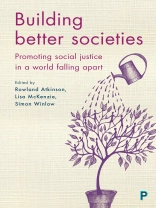What would it take to make society better? For the majority, conditions are getting worse and this will continue unless strong action is taken. This book offers a wide range of expert contributors outlining what might help to make better societies and which mechanisms, interventions and evidence are needed when we think about a better society.
The book looks at what is needed to prevent the proliferation of harm and the gradual collapse of civil society. It argues that social scientists need to cast aside their commitment to the established order and its ideological support systems, look ahead at the likely outcomes of various interventions and move to the forefront of informed political debate.
Providing practical steps and policy programmes, this is ideal for academics and students across a wide range of social science fields and those interested in social inequality.
Table of Content
Who would not be For Society? ~ Rowland Atkinson, Lisa Mc Kenzie and Simon Winlow
Part 1: Problems
The social question and the urgency of care ~ Iain Wilkinson
Better politics – narratives of indignation and the possibility of a prosocial politics ~ Keith Jacobs
Valuing and strengthening community ~ Lisa Mc Kenzie
Part 2: Ideas
Confronting the roots of violent behaviour ~ Anthony Ellis
In defence of the public city ~ Martin Coward
Artfully thinking the prosocial ~ Deborah Joy-Warr, Gretel Taylor and Richard Williams
Re-visioning exclusion in local communities ~ Kate Pahl and Paul Ward
Putting ‘the social’ back into social policy ~ Steve Corbett and Alan Walker
Part 3: Futures
Progress through protest ~ Sam Burgum
Cities, crises and the future ~ Sophie Body-Gendrot
Policy steps towards a better social future ~ Michael Orton
The (in)visibility of riches, urban life and exclusion ~ Rowland Atkinson
The uses of catastrophism ~ Simon Winlow
Conclusion: Thinking the Prosocial ~ Rowland Atkinson, Simon Winlow and Lisa Mckenzie
About the author
Simon Winlow is Professor of Criminology at Northumbria University.












